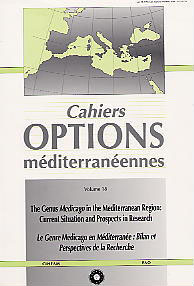| Article précédent | p. 113-117 | Article suivant |
Réponse des Medicago annuelles a deux souches de Rhizobium meliloti dans le semi-aride tunisien
Response of Medics inoculation was conducted using two Rhizobia strains (native and introduced inoculum) on three cultivars: M. truncatula var. Jemalong and two Tunisian ecotypes: M. polymorpha and M. murex. The treatments (T) were: T1- non inoculated cultivars, T2- non inoculated cultivars + 66 N ha-1, T3- inoculated cultivars with introduced inoculum (M-28), and T4- inoculated cultivars with native strain. Results have shown that inoculation increased dry matter yield and nitrogen content in both plant and soil. Native strain was more efficient for M. truncatula var. Jemalong and M. polymorpha. M. murex was not infected by any of the strains. M. polymorpha produced more nodules than the two other cultivars. Non inoculated cultivars + 66 N ha-1 and cultivars inoculated with native strain have equilibrated development for root and shoot systems. Cultivars under the other treatments will develop more roots than shoots leading to a yield decrease.
- [ Afficher ]
- [ Télécharger ]
- [ Exporter la citation ]
Vous pouvez télécharger la citation au format :
- [ Imprimer ]
-
Mots-clés
CROISSANCE, FORMATION DE NODOSITES, INOCULATION, MEDICAGO, PLANTE ANNUELLE, TUNISIECiter cet article
Mezni M.Y., Sifi B. Réponse des Medicago annuelles a deux souches de Rhizobium meliloti dans le semi-aride tunisien. In : Genier G. (ed.), Prosperi J.M. (ed.). The Genus Medicago in the Mediterranean region: Current situation and prospects in research . Zaragoza : CIHEAM, 1996. p. 113-117. (Cahiers Options Méditerranéennes; n. 18). Meeting of the Mediterranean Working Group on Medicago of the FAO/CIHEAM Inter-Regional Research and Development Network on Pastures and Fodder Crops, 1995/10/19-22, Hammamet (Tunisia). http://om.ciheam.org/om/pdf/c18/96605765.pdf



